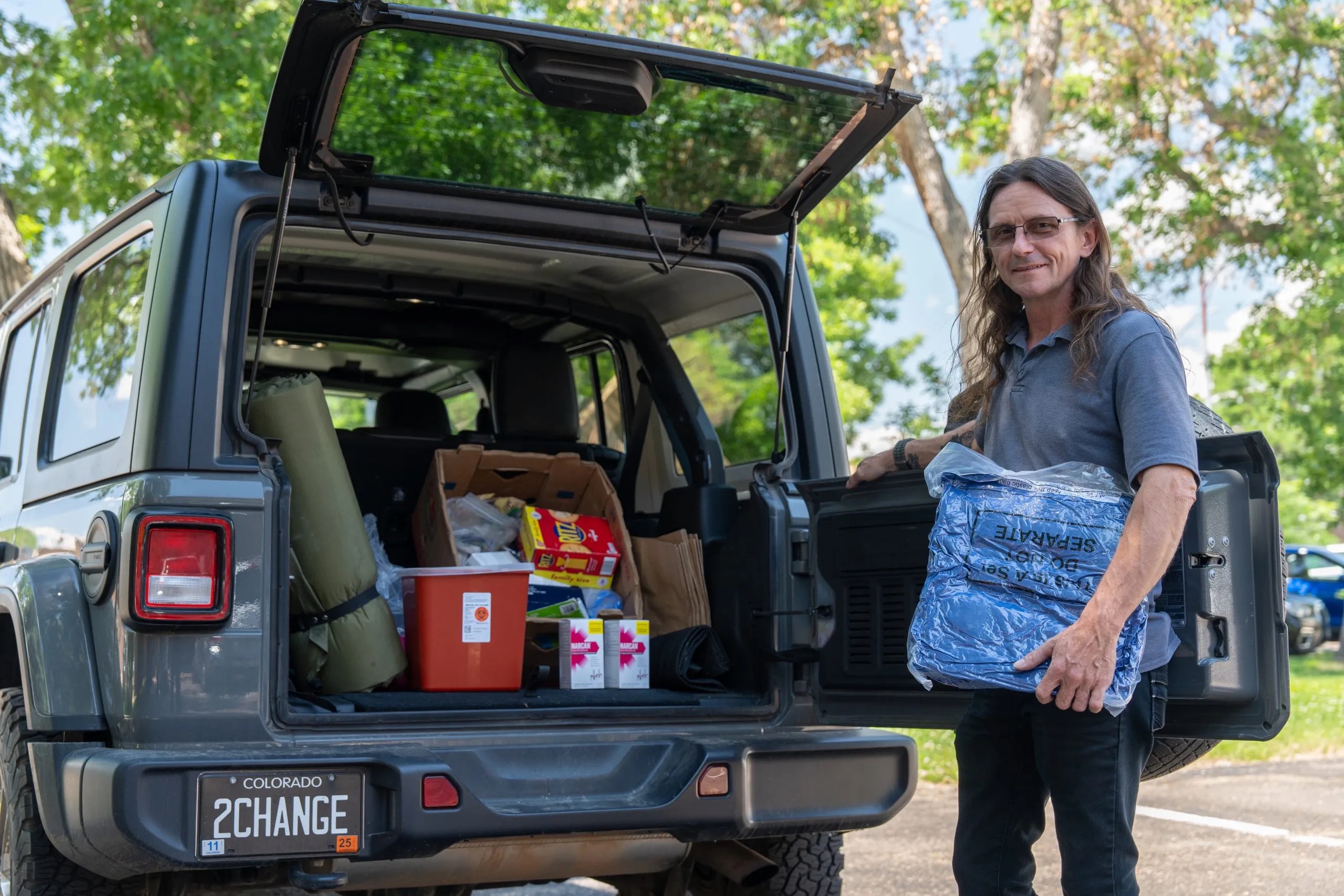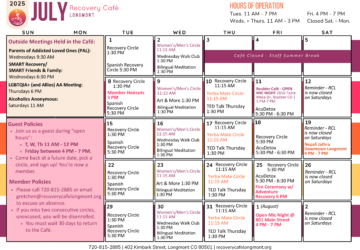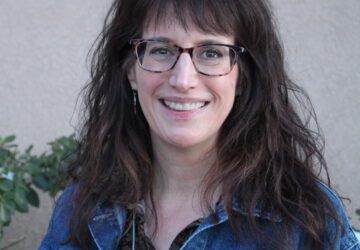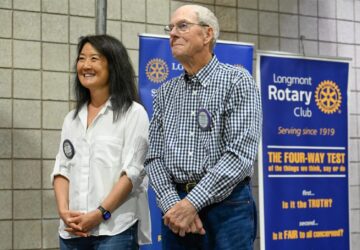
Boulder Reporting Lab: ‘An angel without wings’: How one man is helping hundreds in Boulder County find the path to recovery
Officially, he’s a community peer recovery navigator at the Longmont Recovery Cafe, a space for people healing from addiction. Unofficially, he’s a recovery fixer, the go-to person for getting someone into treatment quickly, even when the system makes it hard. Under his guidance, wait times that stretch for months are sometimes reduced to days, helping providers reach people during the narrow window when they’re ready to get sober.
“We talk about the pre-Harold and the post-Harold era,” Officer Ross Maynard of the City of Boulder’s Homeless Outreach Team said. Pre-Harold, “it was a lot of scarcity, and a lot of us not knowing what to do. There was a lot more of a chance that you’d just be turned away because there was no bandwidth, no more spaces.”
Now, the team calls Niedzielski, who began this work in December 2023.
So do many nonprofit and government employees working with people struggling with substance use and homelessness. The county’s Behavioral Health Assistance Program frequently relies on Niedzielski’s expertise to connect people with the right treatment. He checks in daily with treatment centers as far away as Colorado Springs, Steamboat Springs and Fort Lyons about available beds. Some text him directly when beds open. He joins Boulder police’s Homeless Outreach Team every Friday, visits the All Roads shelter weekly and often stops by transitional housing sites like Bluebird. He also hands out his number to people living on the street and encourages them to call when they’re ready.
He estimates he receives between 20 and 70 calls each day, seven days a week, and has gotten at least 800 people into treatment in the past two years.
“They call Harold The Houdini, because he can do whatever,” said Miguel Saucedo, who Niedzielski has gotten into treatment twice.
Maynard said that if someone walks up to him ready to get sober, he can call Harold and have them in a clinic in 24 to 48 hours. “I’ve been a police officer in Boulder for 15 years. That has literally never existed,” he said.
‘I’ve been to the battle and know what it is’
Niedzielski has strong relationships with many of his collaborators, but especially deep ones with the people he’s helped get sober.
“I’ve been to the battle and know what it is,” Niedzielski said.
“He definitely inspires me,” said Jeffery Morrison, who was living on the streets in Longmont and had been battling alcoholism for over 20 years when he met Niedzielski last year. “He’s been through a lot more than I have, [and] made me think if Harold can do all that and do what he’s doing now, I can do that too.”

Niedzielski, 53, was raised by a single father, first in Northern California and later Minneapolis. He was introduced to alcohol and marijuana at six. At seven, he started smoking cigarettes. At 11, he was introduced to intravenous drugs. By 12, he had dropped out of school and left home, spending periods of his childhood homeless.
“I was out there around gangsters, people that are involved in the sex trafficking trade and people involved in the drug trade,” he said. “I grew up fast.”
At 13, a woman pretended to be his mom and claimed he was older so he could get a job at Wendy’s. He briefly got an apartment with a roommate, whom he found dead by suicide in the bathroom. Weeks later, a close friend was shot and killed in front of him in downtown Minneapolis.
At 15, he called a family friend in Alaska who had offered to help, and moved north. “It gave me the opportunity to change and not have to be that person that I became out on the streets,” he said.
He worked various jobs — selling airline tickets, cooking, working at an underground gold mine — and began rebuilding a relationship with his father. At 17, he invited his dad to Alaska for Christmas for the first time. Days later, he learned his father had late-stage cancer. Within weeks, he died.
“He was my rock; he was my only parent. And it was devastating,” Niedzielski said. “It changed my life.”
At 21, he started using again, and was introduced to crack cocaine. “That lasted about two weeks, and I knew it was time to go,” he said.
He quit his job, gave away his belongings and drove to Minneapolis to be near his siblings. He began working at their restaurant, where the bar became a “nonstop party,” and he fell back into substance use.

His struggles escalated. He got a DUI and went to rehab. He started using meth. He got married — during which time he didn’t use — then divorced, began using again, moved to Colorado and started trafficking drugs. Over his late 20s and early 30s, his “drug trafficking got worse, enormously.”
Later, he moved in with the same family friend — now in Wisconsin — and got sober again. “I was happy. I was free from substances, away from that life.”
But after a year, he started using and trafficking meth again. Deep in the drug trade, he had unlimited access. He was eventually busted in 2005. He went to prison for four years, did well for a period, then began dealing again.
“I got busted a few times,” he said, “But the last time, that was the end of the road.” He received 11.5 years for a relatively minor charge due to his record, and was told the next time could mean 25 to life.
“I knew I needed to change,” he said. “When I was getting sentenced, they made a comment: ‘Your honor, he never mentioned one thing about doing anything to give back to the community.’ I thought about it, and you know, they were right.”
Determined to do better, he stopped speaking to everyone from his old life, including family. He got sober and has stayed sober for nine years.
“The whole time I was in prison, I thought of how I could be a better person to help other people, or what I could do to make up for the things that I’ve done,” he said.
Niedzielski was released in 2022, moved in with his sister in Boulder and began applying for jobs.
“I kept getting rejection after rejection when I did a background check,” he said. One day, while visiting the Reentry Initiative for help, someone invited him into the Recovery Cafe downstairs. The moment he walked in, something clicked, and everything changed.
“I knew that this was for me,” he said. “It sent me off on a whole different mission.”

He began volunteering and taking trainings, filling a wall with certificates: motivational interviewing, certified addiction counseling, recovery coaching, suicide prevention and scores more.
In 2023, Niedzielski started working part-time at the Recovery Cafe and full-time at Tribe Recovery Homes.
His current position, funded through the state’s opioid response grants, “was handed to me through the cafe.” he said. “I ran with it.”
He was supposed to help about 10 people into treatment each month. Now he averages 20 to 80.
Peer support, around the clock
Niedzielski said peer support — “people that actually had lived experience and knew what I was going through” — was the thing that finally helped him get sober.
Now, he is that person for others.
“It makes getting into recovery a lot easier than talking to just a typical random therapist who’s read something in a book,” Morrison said.
Niedzielski works 90 to 100 hours a week, seven days a week. “Last year I took four days off,” he said.
“I don’t have to work all those hours. I choose to,” he added. “It doesn’t change how much I get paid. It’s not about that. My big thing is people that need help.”
His car is stocked with blankets, hygiene kits, snacks and water. He drives people to treatment and to court. He collects donated bikes and gives them away. He stays in touch for as long as they want — sometimes years — and picks up the phone at 2 a.m. In many cases, he becomes a core part of a new support system for people who’ve had to cut ties with family or friends.
“He is an angel. I want to have whatever he’s got,” said Matthew Paquette, who’s nearly a year sober after over 30 years of intravenous drug use. “That love, that goodness.”
When Paquette nearly quit treatment, overwhelmed by memories of old trauma no longer being muted by drugs, Niedzielski was the only person he would speak to.
“He talked me off my ledge,” Paquette said. “In my life, I never had anybody care about me like that, ever.”
Paquette is now working toward becoming a peer recovery navigator himself.
“I want to work for Harold and I want to be a part of people’s sobriety,” he said. “I think it’s wonderful.”

‘He saved my life’
Like Paquette, Morrison is one of several people who say they owe their life to Niedzielski.
“I honestly feel like I wouldn’t be here if it wasn’t for Harold,” he said.
Morrison had been turned away from treatment over residency requirements. “It was pretty heartbreaking,” he said.
But Niedzielski promised to get him in, and did.
“Whatever you’re doing, I know you got a bottle, put it down,” Morrison remembers him saying. “Stop drinking and come meet me at noon.”
“Honestly, my heart jumped, he said. “It felt great, it really did. I was like, ‘Wow, this is really happening. It’s not just talk.’”
Niedzielski said most people don’t succeed after their first time in rehab. But if they want to try again, he finds them another bed.
Saucedo relapsed almost six months ago, returned to Niedzielski and was struck by the fact he still believed in him. He’s now six months sober and preparing to coach others through recovery. “That man literally saved my life, not once but twice,” he said.
“Nobody’s perfect. It takes a few times,” Niedzielski said. “But I don’t give up on those people.”
What’s next for the Houdini

Niedzielski recently quit his second job to focus on his next goal: opening his own clinic.
As of last month, 38 people had overdosed in 2025 in the City of Boulder alone, and at least four had died, an increase over last year. The county has just 10 residential treatment beds. Niedzielski wants to fill that gap.
He hopes to open Our House in Longmont by September, a minimum 90-day program with a tiered model: partial hospitalization and intensive outpatient programming, transitional housing and sober living and recovery services. He has a full staff lined up — some people he’s helped into recovery.
He doesn’t yet have a building or all the funding. “I’m putting in everything I have,” he said. “I’ve worked two jobs and saved everything I can to make this happen.” He’s seeking donors, too.
“I never dreamed I’d open up a recovery program,” Niedzielski said. “I’ve been out there before. It’s hard when you have nobody and nothing. So I worked very hard to get out there and establish these relationships with everybody, and let them know there are people in the community that care.”


